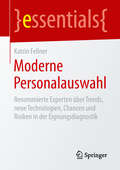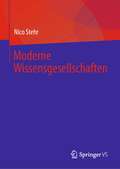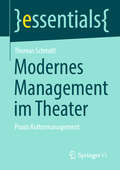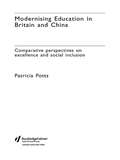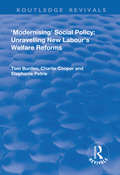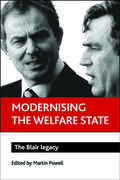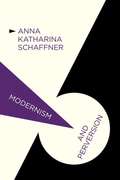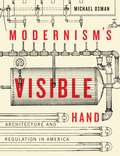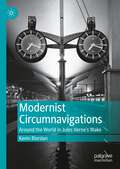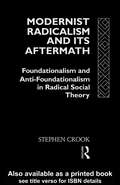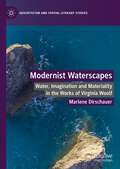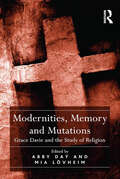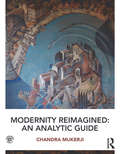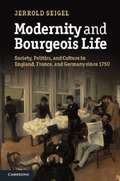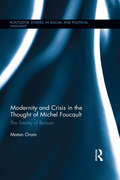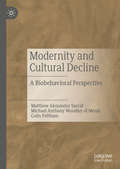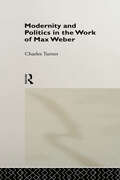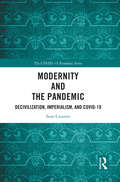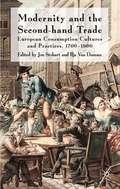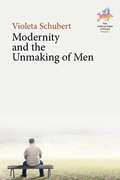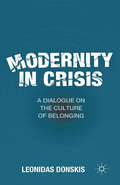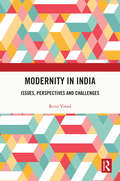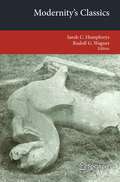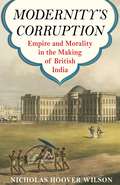- Table View
- List View
Moderne Personalauswahl: Renommierte Experten über Trends, neue Technologien, Chancen und Risiken in der Eignungsdiagnostik (essentials)
by Katrin FellnerAn die Personalauswahl werden immer höhere Anforderungen gestellt. Aufgrund zahlreicher Veränderungen, die durch die Digitalisierung und die Demografie angetrieben werden, ist es wichtiger denn je, informiert zu bleiben. Eine qualitative Ausarbeitung von Interviews ermöglicht einen Überblick über aktuelle Debatten, kursierende Begriffe, neue Technologien und Auswertungsmöglichkeiten. Namhafte Experten aus Forschung und Praxis geben Anhaltspunkte zu Qualitäts- und Datenschutzfragen, die sich mit dem Aufkommen zahlreicher mehr oder wenig seriöser Angebote vermehrt stellen. Im Spannungsfeld zwischen klassischen eignungsdiagnostischen Herangehensweisen und neuen Technologien werden Trends aufgegriffen sowie Chancen und Limitationen diskutiert.
Moderne Wissensgesellschaften
by Nico StehrDie zentrale These des Buches lautet, dass nicht Natur, Unfälle, Gewalt, Katastrophen, Macht usw., sondern Wissen mehr denn je die Grundlage und Richtschnur menschlichen Handelns in allen Bereichen unserer Gesellschaft ist. Diese Untersuchung über Wissensgesellschaften ist daher als Antwort auf die grundlegende Beobachtung geschrieben, dass die moderne Wissenschaft keineswegs nur, wie heute noch oft angenommen wird, der Schlüssel und Zugang zu den Geheimnissen der Natur und des menschlichen Verhaltens ist, sondern vor allem das Werden einer Welt: Wissen als Motor und nicht nur als Kamera. Diese beispiellose Bedeutung des wissenschaftlichen Wissens bedeutet jedoch nicht, dass es ihm gelingen wird, traditionelle Lebensweisen und Einstellungen einfach zu überrollen, wie immer wieder erhofft oder ernsthaft befürchtet. Gleichzeitig sind Wissensgesellschaften keine soziale Formation im Stillstand. Die Dynamik des Wirtschaftssystems von Wissensgesellschaften, die Hand in Hand mit der Verrechtlichung von Wissen als der wichtigsten Ressource von Wissensgesellschaften geht, führt unmittelbar zur Transformation der Wissensgesellschaft in einen Wissenskapitalismus..
Moderner Antisemitismus unter Muslimen in Deutschland (essentials)
by Juliane WetzelDer vorliegende Beitrag gibt einen Überblick über die wichtigsten Entwicklungen antisemitischer Vorkommnisse. Untersucht wird, ob von einem spezifischen Antisemitismus unter Muslimen in Deutschland ausgegangen werden kann oder ob es sich nicht vielmehr um antisemitische Stereotypisierungen handelt, die ebenso in der Mehrheitsgesellschaft virulent sind. Auch mit Blick auf mediale Berichterstattungen judenfeindlicher Vorfälle in Deutschland, in deren Fokus der ,,muslimische Antisemitismus" steht, wird diskutiert, in welcher Form das Eingeständnis von Eigen- und Fremdverantwortung für antisemitische Vorkommnisse in Deutschland durch Islamfeindlichkeit motiviert ist.
Modernes Management im Theater: Praxis Kulturmanagement (essentials)
by Thomas SchmidtDie deutschen Theater befinden sich im Umbruch: In der Kritik stehen die veralteten Strukturen und die steile Hierarchie (Intendanten-Modell), die schlechten Arbeitsbedingungen und die Überproduktion. Das vorliegende Essential ist der Versuch, in knapper Form das Modell eines modernen Theatermanagements zu skizzieren, dass auf ethischen Maßstäben, Reformen, Diversität und Nachhaltigkeit beruht, mit dem Ziel das Theater ins Zentrum der Gesellschaft zu führen. Das Theater wird als künstlerisches Multi-Funktions-Unternehmen und Lernende Organisation begriffen, mit der zukünftigen Einbindung aller Stakeholder und der Integration ethischer und moderner Diskurse.
Modernising Education in Britain and China: Comparative Perspectives on Excellence and Social Inclusion
by Patricia PottsIn spite of the perceived differences between Eastern and Western culture and society, the education systems of Britain and China can be seen to share certain goals, priorities and challenges. Modernisation is very much a core objective for educators in both countries. Moreover, both education systems must confront the tension between promoting social inclusion and achieving competitive academic excellence.Based upon the author's extensive teaching experience and over a decade's research into inclusion and exclusion in Britain, China and Hong Kong, this book provides an original, stimulating and insightful perspective on inclusive educational reform in two different cultures. It examines a broad range of educational environments, from kindergartens to teacher training colleges, and draws upon a fascinating diversity of official and personal documentary sources. Primarily concerned with the question of inclusion, the book also addresses issues of language and communication, gender imbalances and inequalities, curricula for teacher education, critical questioning and frameworks for learning support.
Modernising Social Policy: Unravelling New Labour's Welfare Reforms (Routledge Revivals)
by Charlie Cooper Tom Burdon Steph PetrieThis title was first published in 2000: The 1997 election marked the prospect of a new era in social welfare - the possibility of establishing a third phase in the post-war history of the welfare state (the first being the creation of the Keynesian welfare state, the second the Thatcher/Major neo-liberal reforms). The key aim of this book is to critically explore the options for the future of welfare under New Labour. The welfare state that the government inherited from the Conservatives is widely believed to be in a critical condition. At the same time, there is evidence of widening social inequality in Britain which existing social policy measures fail to address. Whilst acknowledging that future welfare strategies are likely to operate within a market paradigm, the key argument of this book is that welfare providers should operate within a more accountable and democratic environment where service-users have the right to participate in decision-making processes affecting their welfare - regardless of the ability to pay. The book concludes that the dominant discourse shaping social policy in Britain must be recognized and should not be accepted uncritically and that there are very real economic (as well as social) benefits from taking measures to address social disadvantage.
Modernising the welfare state: The Blair legacy
by Edited by Martin PowellTony Blair was the longest serving Labour Prime Minister in British history. This book, the third in a trilogy of books on New Labour edited by Martin Powell, analyses the legacy of his government for social policy, focusing on the extent to which it has changed the UK welfare state. Drawing on both conceptual and empirical evidence, the book offers forward-looking speculation on emerging and future welfare issues. The book's high-profile contributors examine the content and extent of change. They explore which of the elements of modernisation matter for their area. Which sectors saw the greatest degree of change? Do terms such as 'modern welfare state' or 'social investment state' have any resonance? They also examine change over time with reference to the terms of the government. Was reform a fairly continuous event, or was it concentrated in certain periods? Finally, the contributors give an assessment of likely policy direction under a future Labour or Conservative government. Previous books in the trilogy are New Labour, new welfare state? (1999) and Evaluating New Labour's welfare reforms (2002) (see below). The works should be read by academics, undergraduates and post-graduates on courses in social policy, public policy and political science.
Modernism and Perversion: Sexual Deviance in Sexology and Literature, 1850–1930 (Modernism and...)
by Anna Katharina SchaffneCharting the construction of sexual perversions in nineteenth- and early twentieth-century medical, psychiatric and psychological discourse, Schaffner argues that sexologists' preoccupation with these perversions was a response to specifically modern concerns, and illuminates the role of literary texts in the formation of sexological knowledge.
Modernism's Visible Hand: Architecture and Regulation in America (Buell Center Books in the History and Theory of American Architecture)
by Michael OsmanA groundbreaking history of the confluence of regulatory thinking and building design in the United States What is the origin of &“room temperature&”? When did food become considered fresh or not fresh? Why do we think management makes things more efficient? The answers to these questions share a history with architecture and regulation at the turn of the twentieth century. This pioneering technological and architectural history of environmental control systems during the Gilded Age begins with the premise that regulation—of temperature, the economy, even the freshness of food—can be found in the guts of buildings. From cold storage and scientific laboratories to factories, these infrastructures first organized life in a way we now call &“modern.&”Drawing on a range of previously unexplored archival resources, Michael Osman examines the increasing role of environmental technologies in building design from the late nineteenth century. He shows how architects appropriated and subsumed the work of engineers as thermostats, air handlers, and refrigeration proliferated. He argues that this change was closely connected to broader cultural and economic trends in management and the regulation of risk. The transformation shaped the evolution of architectural modernism and the development of the building as a machine. Rather than assume the preexisting natural order of things, participants in regulation—including architects, scientists, entrepreneurs, engineers, managers, economists, government employees, and domestic reformers—became entangled in managing the errors, crises, and risks stemming from the nation&’s unprecedented growth.Modernism&’s Visible Hand not only broadens our conception of how industrial capitalism shaped the built environment but is also vital to understanding the role of design in dealing with ecological crises today.
Modernist Circumnavigations: Around the World in Jules Verne's Wake
by Kevin RiordanThis book shows how Jules Verne’s Around the World in Eighty Days changed the global imagination. Through his novel, the world was converted into a personal itinerary, scaled to the individual traveller and, by extension, to the individual reader. Exploring Verne’s modern legacy, this study shows how subsequent generations of artists and writers took on Around the World in Eighty Days as an adaptable guidebook to the modern world. It investigates how Verne’s work leads its reader beyond the book itself. It considers Verne’s place in world literature, traces some of the many real reenactments of Verne’s itinerary, and recalls the theatrical adaptations of Verne’s story. Published to coincide with the 500th anniversary of the first circumnavigation and the 150th anniversary of Verne’s novel, this book offers new insights into the largely overlooked influence of Verne on twentieth-century literature and culture and on the field of global modernism.
Modernist Radicalism and its Aftermath: Foundationalism and Anti-Foundationalism in Radical Social Theory
by Stephen CrookModernist Radicalism and its Aftermath investigates the ways in which Marx, Durkheim, Althusser and Habermas are all drawn towards foundationalism, and offers a framework for the analysis of foundationalism in social theory.
Modernist Waterscapes: Water, Imagination and Materiality in the Works of Virginia Woolf (Geocriticism and Spatial Literary Studies)
by Marlene DirschauerThis book identifies water as the key element of Virginia Woolf’s modernist poetics. The various forms, movements, and properties of water inspired Woolf’s writing of reality, time, and bodies and offered her an apt medium to reflect on the possibilities as well as on the exhaustion of her art. As a deeply intertextual writer, Woolf recognised how profoundly water has shaped human imagination and the landscape of the literary past. In line with recent ecocritical and ecofeminist assessments of her works, this book also shows Woolf’s attraction to water as part of an indifferent nature that exists prior to and beyond the symbolic. Through close analyses that span the whole of Woolf’s oeuvre, and that centre on the metaphorical and the material voices of water in her works, Modernist Waterscapes offers a fresh perspective on a writing that is as versatile as the element from which it draws. The monograph addresses postgraduate students and scholars working in modernist studies and Woolf studies in particular.
Modernities, Memory and Mutations: Grace Davie and the Study of Religion
by Abby Day Mia LövheimGrace Davie, one of the world’s most influential scholars in contemporary sociology of religion, has furthered a tradition developed by David Martin and others in comparative sociology of religion and modernity in European and international perspective. Davie’s writings on belief and belonging, particularly in a context outside active Church participation, have contributed important understandings of the cultural role of religion as memory and practice in contemporary European societies. Through her most recent work on new roles of religion in relation to the political, legal and welfare sectors of society, she has addressed debates on the resurgence of religion and the ’post-secular condition’. Modernities, Memory and Mutations presents an overview and critical engagement with contemporary themes in the sociology of religion which will inform current and forthcoming generations of scholars. Reflecting on how Grace Davie’s contributions have influenced their own work and wider debates in the field, leading international scholars engage with themes Davie has critically explored across religious studies and mainstream sociology evolving a new research agenda for sociology of religion.
Modernity Reimagined: An Analytic Guide
by Chandra MukerjiWinner of the American Sociological Association’s Distinguished Book Award in 2012, Chandra Mukerji offers with this remarkable new book an explanation of the birth and subsequent proliferation of the many strands in the braid of modernity. The journey she takes us on is dedicated to teasing those strands apart, using forms of cultural analysis from the social sciences to approach history with fresh eyes. Faced with the problem of trying to understand what is hardest to see: the familiar, she gains analytic distance and clarity by juxtaposing cultural analysis with history, asking how modernity began and how people conjured into existence the world we now recognize as modern. Part I describes the genesis of key modern social forms: the modern self, communities of strangers, the modern state, and the industrial world economy. Part II focuses on modern social types: races, genders, and childhood. Part III focuses on some of the cultural artifacts and activities of the contemporary world that people have invented and used to cope with the burdens of self-making and to react against the broken promises of modern discourse and the silent injuries of material modernism. Beautifully illustrated with over 100 color photographs in its 10 chapters, MODERNITY REIMAGINED is not just an explanation, an analysis of how modern life came to be, it is also a model for how to do cultural thinking about today’s world.
Modernity and Bourgeois Life
by Jerrold SeigelTo be modern may mean many different things, but for nineteenth-century Europeans 'modernity' suggested a new form of life in which bourgeois activities, people, attitudes and values all played key roles. Jerrold Seigel's panoramic new history offers a magisterial and highly original account of the ties between modernity and bourgeois life, arguing that they can be best understood not in terms of the rise and fall of social classes, but as features of their common participation in expanding and thickening networks that linked together distant energies and resources across economic, political and cultural life. Exploring the different configurations of these networks in England, France and Germany, he shows how their patterns gave rise to distinctive forms of modernity in each country and shaped the rhythm and nature of change across spheres as diverse as politics, money and finance, gender relations, morality, and literary, artistic and musical life.
Modernity and Crisis in the Thought of Michel Foucault: The Totality of Reason (Routledge Studies in Social and Political Thought)
by Matan OramFew studies of Foucault have examined his thought from a sustained interdisciplinary perspective. Through the interpretative prism of the concept of the ‘Totality of Reason’, this book suggests an original analytical reading of Foucault's thought. This book addresses Foucault’s characterizations of the Enlightenment, asking whether the developmental history of the modern conception of knowledge – from the Renaissance to the Enlightenment – warrants the conclusion he draws. From the perspective of a critical evaluation of Foucault's thesis on ‘the crisis of modernity’, the book examines whether Foucault, the philosophical and social critic, truly belongs to those intellectual trends known as a ‘deconstruction’ and ‘post-modernism’ that advocate a wholesale rejection of the project of modernity, demonstrating how a classification of this kind contributes to an impoverishment of our understanding of Foucault's thought. This book will attract the attention of readers interested in Foucault, and what is broadly perceived to be the ‘crisis of modernity’. It will appeal to scholars and advanced students of sociology, political philosophy and political science, psychology, philosophy, interdisciplinary studies and cultural studies.
Modernity and Cultural Decline: A Biobehavioral Perspective
by Colin Feltham Matthew Alexandar Sarraf Michael Anthony Woodley of MenieThis book argues that despite the many real advantages that industrial modernity has yielded—including large gains in wealth, longevity, and (possibly) happiness—it has occurred together with the appearance of a variety of serious problems. Chief among these are probable losses in subjective existential purpose and increases in psychopathology. A highly original theory of the ultimate basis of these trends is advanced, which unites prior work in psychometrics and evolutionary science. This theory builds on the social epistasis amplification model to argue that genetic and epigenetic changes in modernizing and modernized populations, stemming from shifts in selective pressures related to industrialization, have lowered human fitness and wellness.
Modernity and Politics in the Work of Max Weber
by Charles TurnerThis rich and assured book is a major contribution to the growing Weber industry. It reveals Weber's theory of modernity in a new and unexpected light.
Modernity and the Pandemic: Decivilization, Imperialism, and COVID-19 (The COVID-19 Pandemic Series)
by Sean CreavenModernity and the Pandemic: Decivilization, Imperialism, and COVID-19 applies the tools of critical social theory to make sense of the COVID-19 crisis and presents a critical sociological analysis of aspects of the political and community response to the pandemic. The book focuses on key themes integral to a sociology of pandemics in the ‘global’ age. Firstly, Creaven argues that cultures of individualism and consumerism, and of pervasive and deeply entrenched social inequalities (i.e. decivilization) significantly weaken the cause of public health by weakening the compliance of people with state-mandated non-pharmaceutical interventions (including and especially physical distancing rules) and encouraging vaccine hesitancy. Secondly, Creaven examines how interstate competition and imperial politics has undermined an effective global policy response to the COVID-19 pandemic. Policy failure with regard to the management of the pandemic is interpreted as being rooted in the dominance of neoliberal ideology and governance in the politics of international relations, particularly in the politics of the leading state actors, by protection of corporate interests at the expense of public health, and in the constraints imposed on state actors by the competitive dynamic of multinational capitalism in the ‘global’ age. Modernity and the Pandemic will appeal to scholars in the humanities and social sciences with interests in neoliberalism and its social, cultural and epidemiological impacts.
Modernity and the Second-Hand Trade
by Jon Stobart Ilja Van DammeBringing together the latest research on the neglected area of second-hand exchange and consumption, this book offers fresh insights into the buying and selling of used goods in western-Europe during the eighteenth and nineteenth centuries, and seeks to re-examine and redefine the relationship between modernity and the second-hand trade.
Modernity and the Unmaking of Men (New Anthropologies of Europe: Perspectives and Provocations #1)
by Violeta SchubertResponding to the renewed emphasis on the significance of village studies, this book focuses on aging bachelorhood as a site of intolerable angst when faced with rural depopulation and social precarity. Based on ongoing ethnographic fieldwork in contemporary Macedonian society, the book explores the intersections between modernity, kinship and gender. It argues that as a critical consequence of demographic rupture, changing values and societal shifts, aging bachelorhood illuminates and challenges conceptualizations of performativity and social presence.
Modernity in Crisis
by Leonidas DonskisA blend of political theory, social theory, and philosophy of culture, the book will show the relationship and tension between thought and action, politics and literature, power and dissent in modern politics and culture.
Modernity in India: Issues, Perspectives and Challenges
by Renu VinodThis book introduces a sociological understanding of the emergence of modernity in India and its ramifications on society, economy, and polity. It outlines the main features and context of modernity, as described in classical and later texts of modernity. The essays examine the transformation of Indian society as a consequence of the British colonial encounter resulting in social, economic, and political interventions. It also delineates the Indian context by defining the term community, and its close association with caste and religion, and subsequently examines the challenges in building a pan-Indian or national consciousness with a sense of ‘we-ness’ or common identity. Most importantly, the book also studies the politics of government formation after independence, and the role of dominant castes and classes in gaining power at the Centre. The book concludes with an outline of the definitions and historical practices of social exclusion in India, their contemporary configurations, the image of a socially, economically, and politically exclusive Indian modernity that poses challenges to the Indian state and civil society on account of the exclusion of multiple groups. This book would be useful to the students, researchers and teachers of sociology, women and gender studies, history, economics, political science, and other interdisciplinary courses in social sciences. The book will also be valuable reading for those interested in South Asian studies, especially post-colonial contemporary Indian society.
Modernity's Classics
by Rudolf G Wagner Sarah C. HumphreysThis book presents critical studies of modern reconfigurations of conceptions of the past, of the 'classical', and of national heritage. Its scope is global (China, India, Egypt, Iran, Judaism, the Greco-Roman world) and inter-disciplinary (textual philology, history of art and architecture, philosophy, gardening). Its emphasis is on the complexity of the modernization process and of reactions to it: ideas and technologies travelled from India to Iran and from Japan to China, while reactions show tensions between museumization and the recreation of 'presence'. It challenges readers to rethink the assumptions of the disciplines in which they were trained
Modernity's Corruption: Empire and Morality in the Making of British India
by Nicholas Hoover WilsonToday, “corruption” generally refers to pursuing personal interests at the expense of one’s responsibilities, the law, or the common good. It calls to mind some official violating their public duty for private gain, suggesting seamy bureaucracies taking payoffs, kickbacks, and bribes. Yet at other times, notions of corruption were rooted in a more expansive view of the causes of people’s behavior and the appropriate ways to regulate conduct. In this understanding, to be “corrupt” meant losing a delicate balance among competing appetites under specific circumstances and in the eyes of peers. Why did a narrower definition of corruption become dominant?Nicholas Hoover Wilson develops a new account of the changing category of corruption by examining the English East India Company and its transformation from a largely commercial enterprise to a militarized offshoot of British empire in the eighteenth and nineteenth centuries. He argues that the modern idea of corruption arose as an unintended consequence of conflicts among company officials and the changing audiences to which they justified themselves in Britain. This new understanding unified an imperial elite at risk of fragmenting into irreconcilable moral worlds and, in the process, helped redefine the boundaries of state, society, and economy. Modernity’s Corruption is at once a novel historical sociology of imperial administration and its contradictions, a fresh argument about the nature of corruption and its political and organizational effects, and a reinvigoration of classic arguments about the nature and consequences of global modernity.
